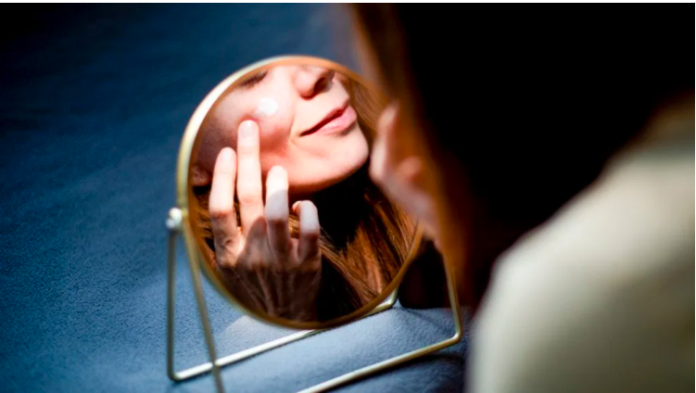Glowing skin is something many people strive to have. For some, radiant skin is an outward sign of health, while others wish to achieve this look for cosmetic reasons.
There are many ways to improve the skin’s radiance. People can improve the health of their skin by making diet and lifestyle changes. There are also many skin care and makeup products on the market that can give the appearance of glowing skin.
In this article, we will look more closely at what glowing skin is, the factors that influence it, and how to work towards it.
What is glowing skin?
Glowing skin means different things to people. Many people use the term to refer to skin that looks healthy and “awake” rather than dry, dull, or unevenly textured. For some, healthy skin results in a natural sheen, or “glow.”
Healthy skin is something that most people can work towards. Typically, healthy skin will appear:
- smooth, with few breaks or blemishes
- adequately hydrated, being neither too dry nor too oily
- fairly even in color, rather than red or inflamed
It is important to note that healthy skin does not mean perfect skin. Perfect skin is not attainable. Skin can be healthy and glowing, while also having normal characteristics, such as:
- visible pores
- fine lines and wrinkles
- birth marks
- occasional blemishes
Factors that influence skin health
Everyone’s skin is different. Some people may be naturally more able to achieve a glowing appearance than others due to a range of factors.
The factors that influence skin health include:
- Genetics: A person may be more likely to have dry or dull skin due to their genes. Some dry skin conditions, such as atopic dermatitis, are related toTrusted Source genetics.
- Hormones: Fluctuations in hormone levels can trigger breakouts of acne and change how oily or dry a person’s skin is. This is true for people of all sexes, particularly during puberty, pregnancy, and menopause.
- Health conditions and medications: If a person has other coexisting health conditions, or takes medications, this could impact the health of their skin. For example, hormonal birth control can have either a positive or negative influence.
- Environment: Exposure to sunlight, extreme temperatures, dry air, tobacco smoke, and pollution can all have a negative impact on the skin.
- Behavior: Water intake, diet, sleep, stress, and exercise can influence the skin. The products a person uses on their skin can also either help or hinder skin health.
It is not possible to control all of these factors, but there are many a person can change in order to promote healthy skin. We will look at some of these in the following sections.
Skin care for glowing skin
Many people start working towards healthy-looking skin with skin care products. This can feel complicated, as there are many companies that claim their products will help someone achieve glowing skin.
However, the Academy of American Dermatology (AAD) states that skin care does not have to be complex or expensive. Many people benefit from a simple routine that consists of cleansing, moisturizing, and sun protection.
Cleansing
Cleansing products help remove dirt, makeup, and excess oil from the skin. When choosing a cleanser, it is important to look for one that is gentle, pH-balanced, and does not include harsh chemicals or soap.
Cleanse the skin upon waking up, before going to sleep, and after sweating. Use warm water rather than cold or hot, and pat the skin dry with a clean towel.
Moisturizing
Moisturizers add water to the skin. For best results, the AAD recommends applying moisturizer immediately after cleansing in order to to trap moisture in the skin.
People with oily skin may prefer an oil-free moisturizer, while those with dry skin may prefer something heavier that contains oils or butters.
Sun protection
Sunlight contains UV light, which can cause burning, sun damage, and visible signs of aging. Applying an SPF product before going outside is an easy way to reduce the risk. When choosing an SPF product, look for one that is:
- broad spectrum
- SPF 30 or above
- suitable for a person’s skin type
Apply sunscreen to all areas of exposed skin, including around the eyes and neck. When the sun is at its strongest, stay in the shade or wear lightweight clothing and a hat to cover the scalp.
Other products
There are additional products that may help with attaining healthy skin, depending on a person’s specific concerns. For example, chemical exfoliants are popular products that dissolve the top layer of skin cells, making way for new cells underneath. People can use these to improve skin texture and appearance.
Apply chemical exfoliants after cleansing but before moisturizing.
Chemical exfoliants are not always suitable for those with darker skin. They can also increase the skin’s sensitivity to sunlight. Always wear SPF when using a chemical exfoliant.
Shaving
Hair removal can easily cause irritation, ingrowing hairs, or a shaving rash. To avoid this:
- wet the skin and hair
- use a shaving balm or cream to lubricate the skin
- shave in the direction the hair grows with a clean, sharp razor
- rinse the razor after each pass
- allow the razor to dry completely after use
Foods for glowing skin
A healthy diet benefits the entire body, including the skin. Even if a person has a good skin care routine, they may not find their skin looks healthy if they do not take care of themselves internally.
Avoid foods that are high in sugar, saturated fat, and salt. Instead, focus on:
- fresh fruits and vegetables
- whole grains
- lean proteins
- healthy fats, such as olive oil, avocados, and nuts
Certain nutrients are especially important for skin health. These include:
| Nutrient | Benefits | Food sources |
| Vitamin A | EssentialTrusted Source for the growth and maintenance of healthy skin cells; may protect against skin cancer. | beef liver, sweet potato, spinach, carrots, cantaloupe |
| Vitamin B2 (Riboflavin) | HelpsTrusted Source maintain collagen levels in the skin. | beef liver, fortified breakfast cereals, dairy, mushrooms, almonds |
| Vitamin B6 (pyridoxine) | Deficiency can causeTrusted Source skin rashes, and cracks in the skin around the mouth. | chickpeas, beef liver, poultry, salmon, fortified breakfast cereals, potatoes, bananas |
| Vitamin C | An antioxidant that helps form the skin barrier and collagen, protects against sun damage, and reduces the risk of some skin diseases. | citrus fruits, bell peppers, kiwi, broccoli, strawberries |
| Vitamin D | May play a roleTrusted Source in wound healing, protection against sun damage, and in reducing inflammation. | cod liver oil, seafood, UV-exposed mushrooms, fortified dairy milk and plant milks, fortified breakfast cereals |
| Vitamin E | An antioxidant that helps protectTrusted Source against sun damage. | wheat germ oil, sunflower seeds, almonds, sunflower oil, peanut butter |
| Omega-3 fatty acids | May help some skin conditions and protect against sun damage. | flaxseed oil, chia seeds, walnuts, salmon, herring, mackerel, canola oil |
| Zinc | HelpsTrusted Source skin integrity and wound healing. | oysters, beef, crab, pork, baked beans, fortified breakfast cereals, pumpkin seeds, chickpeas |
Lifestyle changes for glowing skin
Making some simple lifestyle changes can have an impact on skin health and appearance. They include:
Stopping smoking
Smoking can contribute to several skin problems, including:
- premature aging, including the appearance of wrinkles
- slow wound healing
- skin infections
- some skin disorders, including psoriasis
Smoking also increases the riskTrusted Source of squamous cell skin cancer, particularly on the lips.
Relieving stress
Stress can impactTrusted Source the skin in a number of ways. Scientists believe that it can raise inflammation levels, decrease blood flow to the skin, and delay skin healing.
Reducing stress and making time to relax is generally beneficial for the body and mind. People can do this by:
- reducing any stressful activities they do not need to do, such as by delegating them
- making time for activities they enjoy or find stress-relieving
- winding down before sleep every night
- practicing yoga, breathing exercises, or mindfulness
Learn five relaxation techniques to try.
Getting enough sleep
Sleep can help support mental health and allow the body to heal from damage, which can benefit the skin.
A small 2015 studyTrusted Source found that a lack of sleep was associated with skin aging, reduced barrier function, and dissatisfaction with the skin’s appearance among 60 white women. However, because the study did not include people of other genders, ethnicities, or races, this may not reflect a broad range of opinions.
Aim for 7–9 hoursTrusted Source of sleep every night.
Drinking water and reducing alcohol consumption
The body requires adequate water intake to stay healthy. While there is limited evidence that drinking more water directly improves the skin’s appearance, a 2015 studyTrusted Source found that drinking enough does help the skin function.
In contrast, alcohol can trigger or worsen:
- facial redness
- flushing
- rosacea
- psoriasis
- dermatitis
- skin infections
Exercising
A 2015 studyTrusted Source looking at sedentary older adults found that regular aerobic exercise for 3 months significantly improved skin structure. The researchers suggest that regular exercise may therefore improve age-related skin deterioration.
Physical activity improves general health, so aim for 150 minutesTrusted Source of moderate-intensity aerobic activity, such as brisk walking, every week. Alternatively, aim for 75 minutes of vigorous-intensity aerobic activity every week.
These aforementioned tips may help some people work towards healthier skin. However, people with underlying skin conditions, such as persistent acne, discoloration, dryness, eczema, or other rashes may require treatment from a dermatologist.
People should speak with a doctor promptly if they notice:
- changes to a mole
- sudden or persistent rashes, hives, or other forms of skin irritation
- signs of skin infection, such as pain, swelling, or oozing sores
- severe or slow-healing wounds
Naturally glowing skin is typically skin that is healthy and hydrated. People can work towards this by gradually implementing a skin care routine, as well as by making changes to their diet or lifestyle where necessary.
Smoking, alcohol, and UV light can all damage skin health, so avoid these where possible.




